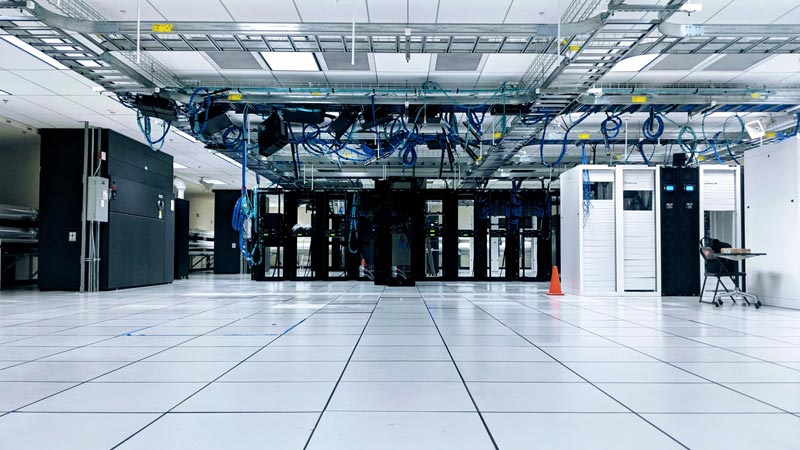Data center security is essential, not only to protect data you host against cyber attack or corruption, but also against physical threats like fire from overheating servers, electrical malfunction, or other unexpected cause.
If a fire starts in your data center, are you prepared to extinguish it quickly and safely? Do you have a plan in place to minimize damage to your facility or employees? Is your facility set up to prevent fire from starting in the first place? If your answer to any of these questions is anything other than a resounding yes, keep reading.
Data Center Fire Protection Best Practices
Whether you’re setting up a new data center or fortifying an existing one, here are some tips and best practices to protect your equipment and staff from the danger of a fire.
#1 Use Fire-Resistant Construction
Data centers can be vulnerable to fire, but resistant construction can help prevent fire and the damage that comes with it. When building or outfitting your facility for fire preparedness, consider the 3 levels of data center fire protection.
3 Levels of Fire Protection:
- Building: At the building level, your data center should include systems to protect your structure and any people in it. This includes fire sprinkler systems, handheld extinguishers, as well as passive fire protection, such as noncombustible materials, firewalls and assemblies that work to delay the spread of fire throughout the building.
- Room: Fire protection in the form of sprinkler systems is required by NFPA 75 and 76. Either wet sprinkler systems, pre-action fire sprinkler systems, or clean agent suppression systems can be used
- Rack: Automated fire detection and suppression systems can be installed on the rack-level to stop fires and minimize damage to sensitive equipment.
Construct any openings with fire-resistant materials that prevent spreading fire and also restrict the passage of smoke. Corrosive chemicals in smoke can cause serious damage to equipment and electronic components in your data center.
#2 Keep Data Center and IT Equipment Rooms Separate
When designing your data center, it’s a smart idea to separate your data center and IT equipment rooms from others in the building. Since these areas are more prone to fire hazards, if a fire occurs, it will likely remain isolated and not quickly spread throughout the building, giving your staff more time to get to safety.
#3 Install Fire Alarms and Suppression Systems
Implementing fire alarms, fire suppression systems, and fire sprinkler systems are best practices for data center fire protection — and also required by NFPA 75 and 76.
When choosing the right systems for your facility, you’ll need to consider which will provide the best level of protection and the least potential for damage to your equipment. For example, to avoid unnecessary water damage to sensitive electronics, you may choose a pre-action system, which is a common fire sprinkler system that requires 2-point detection before the sprinklers are activated.
Better still, a clean agent fire suppression system uses no water at all, meaning no damage or cleanup required beyond that of the fire. A downside to the gas system is that it can only be used once before needing to be recharged.
Whichever system you choose, the alarm and suppression system must be connected to a data center fire protection interface for control, to allow the system to be activated, use an alternative suppression system, sound sprinkler activation alarms, manually control ventilation, or other safety functions.
#4 Commit to Data Center Fire Protection Training and Inspections
Even with state-of-the-art fire suppression technology in your facility, a major part of data center fire protection is the development of safety protocols that keep everyone safe. This includes an evacuation plan that is practiced and clearly posted throughout your facility, a commitment to fire safety training, and regular inspections of your systems and equipment.
Every employee should know how to use a fire extinguisher, and which type of fire extinguisher should be used to address different classes of fire. For example, the fire extinguisher recommended for electrical fires shouldn’t be used to extinguish a flame in the kitchen, or vice versa.
Data Center Fire Protection Maintenance and Inspection
Make sure you keep all equipment maintained and up-to-date, replace extinguishers as necessary and reevaluate your fire safety protocols if the room design changes, you expand or reconfigure equipment, or add more personnel, All of these changes affect your fire safety preparedness and requirements to comply with NFPA standards.
Your fire alarms, fire suppression systems, and sprinkler systems must all be inspected at regular intervals, per NFPA requirements. Your data center fire protection interface must be also regularly inspected to ensure it is working properly and meets the correct sensitivity requirements.
#5 Consult a Professional in Data Center Fire Protection
When building your data center fire protection, it’s always a good idea to consult professionals in the fire safety field. Specialized technicians can make sure you have the best equipment for your facility, it’s updated on a regular schedule, and everyone on your staff knows how to use it.
Data center fire protection is exceptionally important. Let Vanguard Fire & Security systems help you protect your information and electronics with top-of-the-line fire protection and suppression systems. Get a quote for your data center fire protection system today.


